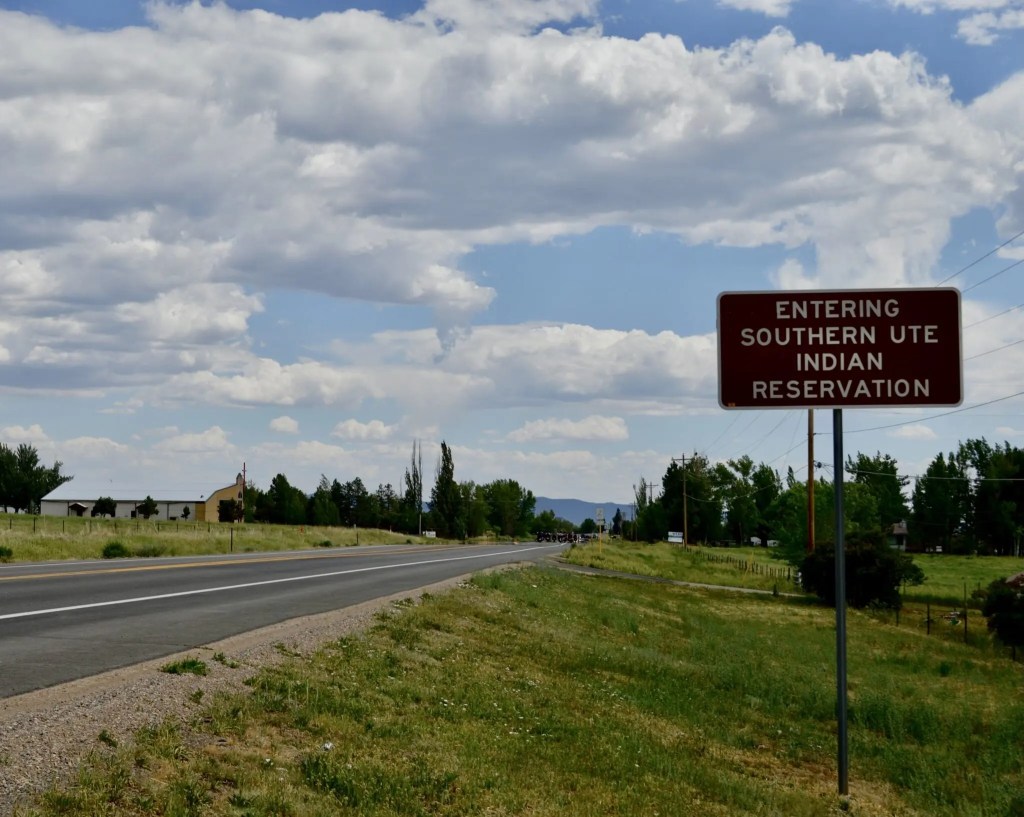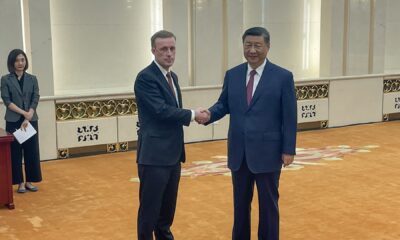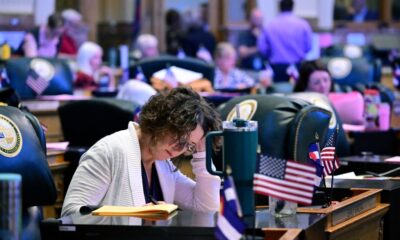World News
Push to expand voting access on Colorado reservations meets resistance

This article was produced and originally published by Bolts, a nonprofit publication that covers criminal justice and voting rights in local governments. Republished with permission.
Lorelei Cloud was born in 1967, three years before Native Americans living on tribal lands in Colorado were guaranteed the right to vote. Even once she turned 18, and for many years thereafter, she did not vote. Her polling place was in Durango, miles from the Southern Ute Indian Tribe Reservation, where she lived, and she had no car with which to access registration services or to cast a ballot. Politicians seldom visited her area, and hardly seemed to represent her interests, anyway.
Cloud is now vice chair of the Southern Ute tribal council, and from the tribe’s headquarters early this summer, she reflected on how much has changed. Since 2019, when Democrats gained a legislative trifecta in the state, Colorado has established a polling place on the reservation and placed a drop box there for mail ballots. The state has also hired special liaisons to promote and facilitate turnout among Native voters. “I don’t want future generations to have to deal with any of what we’ve had to, to get to vote,” Cloud told me. “We should have access to the vote, to shape our own region, our own country.”
Colorado officials are now proposing to go further. In 2023, the state adopted legislation to try something that’s never been done in this country: automatically register tribal members to vote in U.S. elections.
The program, if implemented, would enable tribes to share their membership lists with Colorado elections officials, who’d then use that information to register every eligible person to vote, while giving them a chance to opt out. Since Colorado already mails ballots to every registered voter, this would necessarily mean getting ballots into the hands of more Native people. “We’ve made real steps forward, and we’re going to continue,” Colorado Secretary of State Jena Griswold told me recently. “We always try to push the envelope.”
Cloud, like Griswold, sees immense promise in this plan. When she testified in favor of the law last year, she said Colorado “serves as a model for other states to increase voting among tribal members.” And advocates living in those other states are watching. Several told me Colorado’s reform could be transformative if it spreads nationwide: Roughly one third of the more than six million Native Americans who are eligible to vote across the country are not registered, a share far greater than that of white Americans who are unregistered.
And yet, Cloud is also keenly concerned that the program could make her community more vulnerable. For U.S. election officials to automatically register tribal members to vote, the tribes would need to share certain vital information about their members, such as full name, address, and date of birth. Cloud is hesitant to hand this data over to a state that has, over a long history that she knows too well, been an agent of violence.
“When tribes have given out too much information, that information has been exploited,” Cloud said, nodding to U.S. government and industry having used tribal data and maps to locate natural resources and justify land theft, among other harms. “We have to maintain trust and we have to protect tribal members and their information.”
It’s a worry that other tribal leaders and advocates for Native voting rights echoed in conversations this spring and summer. “We’ve had our lists, our populations, kept by the government before–and that hasn’t ended well for us,” Gabriella Cázares-Kelly, a member of the Tohono O’odham Nation and the top elections official in Pima County, Arizona, told me.
Anticipating that data-sharing would generate concerns, Colorado legislators wrote the law to make the program optional: Tribes can opt in, only if and when they feel comfortable with it. Griswold says she is in no rush to implement this program until tribes want it.
Cloud and other representatives of the Southern Ute Indian Tribe, along with leaders of the Ute Mountain Ute Tribe, their western neighbors, have held ongoing discussions with Griswold’s staff to share their concerns, and work out whether acceptable compromises can be found. They’ve met about 10 times over the last year, exploring what safeguards could be put in place.
Those talks haven’t yet yielded any agreement, though the parties seem cautiously optimistic. The chair of the Ute Mountain Utes even says a breakthrough could come as soon as this year.
Cloud, too, hopes to reach an agreement, but she remains wary. The day we met at the Southern Ute headquarters happened to fall exactly 100 years to the week since Native Americans gained U.S. citizenship. That landmark, Cloud said, at once seems distant and shamefully fresh. “We are the first and original residents of this entire continent,” she told me, standing in a temporary exhibit the tribe set up to commemorate the 100-year anniversary. “The first ones here, and the last to have citizenship.”
We were speaking amid what was, as recently as 1868, a Ute territory of more than 56 million acres. It covered most of what is now the state of Colorado, plus large portions of what are now Arizona, New Mexico, Utah, and Wyoming.
Her tribe today controls less than one percent of that area, a sliver of reservation land near Durango, in southwest Colorado along the New Mexico border. Colorado was once home to more than 40 tribal nations, but just two recognized tribes–the Southern Utes, and the Ute Mountain Utes—are still based here. Cloud thinks constantly about how to protect the 1,500 people enrolled in her tribe, and what remains of their land.
“When the Europeans came in, and our homelands were greatly reduced, you get a disconnection between humans and nature,” she said. “You get traumatic experiences, and trust issues that Native people have with the United States government.”
This tribe’s journey is a familiar one in the broader story of Native American betrayal: members killed or otherwise oppressed at the hands of white settlers; a United States government that encroached gradually, agreeing to and then violating treaties in order to steal land and resources; and eventually tribes shunted by the government onto the reservations they inhabit today.
In various ways, and with varying levels of success, Colorado’s state government has lately been trying, or at least saying it’s trying, to repair this harm. The legislature here has, in the last few years, passed a series of laws and resolutions intended to improve education, water rights, public safety, and more, for Native people living in this state.
Colorado’s new voter registration reform also came out of that repair work. Proponents see it as a valuable step toward making American democracy more inclusive of the land’s original inhabitants. “Historical voter suppression in Colorado has been against Native people and Native people living on tribal lands,” Griswold said. “Understanding that there is this historical backdrop, I’ve really tried to pursue any means to reverse that historical voter suppression and get eligible people registered.”
The state of Colorado already registers citizens to vote automatically, but only at the DMV, when they’re getting a driver’s license or state ID. The program has been wildly successful at signing up new voters, but voting rights advocates worry that it’s leaving behind people who do not go to the DMV and apply for an ID–including many who live on reservations.
The new law expands this automatic approach to tribal enrollment lists. This reform would reach tribal members wherever they may reside, and most Native Americans do not live on reservations. Those who do stand to be most affected, experts said, because they are more likely to be unregistered.
Cloud said she’s all-in on continuing to make voting easier for the tribe, and stressed that she appreciates Griswold’s efforts to build relationships with tribal leaders. But in conversation, she also laid out the difficulties in reconciling her different goals.
“How do we protect our sovereignty? How do we protect our tribal members?” Cloud asked.
And how, she added, can tribal leaders embed those aims within the mechanics of voter registration?
As she pondered these questions, Cloud received an alert on her phone and paused our interview. A Southern Ute member had been reported missing–a 15-year-old girl, the alert stated, last seen a couple of days prior outside the reservation.
Cloud wondered if the girl might already be in New Mexico, or even farther from home. She listed her worries aloud: “Has anybody reached out to her family?”
“What has been done to try to contact her?”
“Have they contacted the neighboring counties, the neighboring states?”
“Do they have the right description of her?”
Whenever this happens, and it happens shockingly often–the girl is the third person to go missing from the reservation in a month, amid a national crisis of missing and murdered girls and women that disproportionately plagues indigenous communities—Cloud thinks of her friend Nicole, who vanished from the area two years ago. For days, Cloud told me, authorities assured Nicole’s loved ones that she’d turn up quickly. “Come to find out,” Cloud said, “she’d been murdered in the first day.”
Cloud resumed our interview. With her mind still on the missing girl, she brought the conversation back to registration policies.
“This actually ties in with the voting: It’s the safety of our members,” she said.
“Knowing our tribal information is out there, we become very vulnerable,” she continued. “People don’t place value on tribal lives. This is very real.”

* * *
Three other states besides Colorado–Michigan, Nevada, and New Mexico—have also adopted laws lately to automatically register Native American tribal members to vote; their reforms, too, have yet to be implemented. Like Colorado, these other states give tribes the option to enter into the program but don’t force it upon them. To date, no tribe in any of these states has agreed to do so.
But at least one tribe may be close to such an agreement: the Ute Mountain Utes, whose reservation is bigger than that of the Southern Utes in both land area and enrolled population, could move on this matter soon by entering into an agreement with Colorado’s government, says their chairman, Manuel Heart.
Sitting in his office on the reservation, Heart echoed some of Cloud’s concerns about how sharing tribal enrollment lists could infringe on tribal privacy and sovereignty. But, after much discussion with the state, he said, he feels ready to get started. He hopes to bring the issue to a vote of the tribe’s elected council soon.
Our interview took place in early June, still weeks away from the state’s June 25 primary. His mail ballot was sitting on his desk as we talked; he’d already filled it out and was keen to cast it as soon as possible.
Heart said his tribe, like the Southern Utes, has benefitted from other, recent reforms meant to facilitate Native voter participation: the Ute Mountain Utes now have a drop box on their reservation, plus an in-person polling center for anyone who’d rather vote that way.
The officials who run elections in this area are proud of these voter services, but acknowledge that turnout remains very low on Ute Mountain Ute land.
Danielle Wells, the elections supervisor in Montezuma County, showed me a map of the area and pointed to where her staff places drop boxes, in all the county’s major towns. In the runup to elections, five of the six boxes yield hundreds of ballots each time elections workers swing by to collect from them, she said. In the drop box on the reservation, though, “we see maybe 20, maybe a dozen,” Wells told me.
The June 25 primary would go on to draw especially low participation: Only 3 percent of registered voters living on Ute Mountain Ute land cast a ballot, according to the clerk’s office, a rate nine times lower than that of Montezuma County voters overall.
The gap isn’t usually that wide, but it’s always there. During the 2020 presidential election, for example, turnout on Ute Mountain Ute land was 50 percent, trailing Montezuma County’s overall turnout of 85 percent. In 2022, when Colorado was electing a governor and other major officeholders, turnout on Ute Mountain Ute land was 22 percent–three times lower than the county’s overall rate. A large turnout gap also persists on Southern Ute land, and studies show that this holds true for Native Americans across the country.
Heart badly wants to increase turnout, but doesn’t fault his tribe’s membership for so often declining to vote. Would you be excited, he asked, to participate in elections that shape a political system so historically hostile to your community, to elect representatives of a government that has stolen from and broken promises to tribes?
“How is a tribal member going to feel when they’ve always been pushed away?” Heart said. “It wasn’t our choice to be put on these reservations. The United States government put us here.”
To this day, in many other states, tribes are still constantly trying to beat back new restrictions–strict voter ID requirements that don’t accommodate tribal ID cards, gerrymandered maps that dilute their representation, inconvenient polling places, and other policies that make it particularly hard for Native Americans, and especially those living on reservations, to have a say in U.S. democracy.
Expansive reforms like automatic voter registration for tribal members remain a political non-starter in many states with large Native populations. “Montana, North Dakota, South Dakota, Alaska would not do that,” Ahtza Dawn Chavez, who runs a non-profit in New Mexico that promotes Native voter participation, told me, naming four states currently under full Republican control. “You have to lay down a solid foundation, and [automatic voter registration] is something that is maybe stage two or three or four of that work. In a lot of states, you’re still at stage one.”
In Arizona, for example, voting rights advocates have spent years fighting restrictions, proposed by Republicans, that could make voting harder for Native people. Arizonans in 2022 narrowly rejected a ballot measure that would have made voter ID laws more stringent; Native voters would have suffered the brunt of those proposed rules.
Cázares-Kelly, the elections official in Pima County, bemoans the many hurdles that already suppress the Native vote in her state of Arizona. Notably, she told me, it can be challenging for Native folks who live on reservations to register to vote because homes there often don’t have addresses in the format typical of non-reservation lands–that is, number, street name, city, state, zip code.
“The home where I grew up, I cannot give you the address for it,” Cázares-Kelly said. “I can tell you where it is: south off of Highway 86 onto Indian Route 15, you turn right at the red fence, drive down the dirt road. There’s a fork in the road and you take a left. Our house is the first one by the big tree. That’s literally my address.”
Since getting elected in 2021, she has found that even well-meaning officials commonly have little understanding of why voter engagement campaigns and election policies that work for most of the population may not work for people who live on reservations.
In Colorado, both the Ute Mountain Utes and the Southern Utes report that voter turnout is often substantially higher for their internal elections, which are administered entirely by the tribes. Neither syncs their tribal elections with Colorado’s; the Ute Mountain Utes vote on a Friday in October and the Southern Utes vote on a Friday in November.
On the Ute Mountain Ute Reservation, Chairman Heart said, few talk much, if at all, about U.S. and Colorado elections. The land is so far removed from Colorado’s population center–it’s a roughly seven-hour drive to Denver, and is in fact much closer to Albuquerque—that for decades both the Southern Utes and Ute Mountain Utes were placed in New Mexico media markets, meaning they’d receive broadcast political advertising meant for that state and not theirs.
Only in the last decade or so have political candidates started regularly visiting the area. “They hardly ever came,” Heart said. “And once they got elected, they never came.”

Ben Nighthorse Campbell, the first and still only person of Native American descent to represent Colorado in Congress, and one of only four Native people ever elected to the U.S. Senate, feels this acutely, because for four decades he has lived on a ranch on the Southern Ute reservation.
He is 91 now, and from an armchair in his home, he, too, said U.S. government officials have broadly and consistently failed Native people on policy concerning elections and voting.
“It’s pretty difficult to ask a people who you’ve dominated, whose wealth you’ve taken over the years, to suddenly help support you getting elected. That’s a long jump,” he told me. “Unless you can show somebody how voting is going to help them, they’ll have a lower interest in it.”
Nighthorse Campbell is bullish on automatic voter registration but understands why tribes may not trust elections officials with their membership data. “It’s not going to take a week or two. It takes years, and years, and years. And maybe it’ll never be universal,” he said.
* * *
The ongoing negotiations between the Ute tribes and the state of Colorado over automatic voter registration affect only a tiny fraction of the country’s nearly 600 federally recognized tribes. These two tribes combined have enrollments of under 4,000 people; a successful implementation of the pending reform in Colorado may only lead to a few hundred new registrations at first, and many fewer each subsequent year.
But Allison Neswood, a lawyer with the Native American Rights Fund and an expert on issues of Native voting rights, says there are many eyes on these negotiations around the country. The outcome of the state’s talks with the two tribes could set a landmark precedent stretching much beyond Colorado, she told me, if the parties can identify solutions that satisfy all their goals.
“Once one tribe, two tribes, three tribes start to get the ball moving on this, and show that there’s a way to do this in a way that’s respectful of and promoting of tribal sovereignty, and that’s protective of data sovereignty, I think more tribes will feel more comfortable diving in and looking for their own approach,” Neswood said.
Voter registration laws created a hurdle to voting when they emerged in the U.S. starting in the 1870s, forcing people to declare an intent to vote before they could cast a ballot. These laws, then and often still today, have depressed turnout among people with fewer resources and less familiarity with the political process. To alleviate this burden, Oregon in 2015 became the first U.S. state to adopt automatic voter registration; the policy has since spread to about half of all states. It’s typically implemented at DMVs, for a couple of simple reasons: One, the vast majority of the population visits these offices on a somewhat regular basis, and, two, the offices already collect all the information necessary to determine voter eligibility. But some states are trying to expand it to other government settings to reach even more people–especially lower-income residents less likely to visit the DMV.
Several states, including Colorado, want to try this out at Medicaid offices, and, last year, Michigan became the first state to approve automatically registering people as they leave prison.
Extending this program to tribal enrollment lists comes from the same desire to make sure fewer people fall through the DMV’s cracks.
Colorado’s reform passed as part of a broader bill to facilitate voting in the state, for instance by expanding ballot access on college campuses. That bill was sponsored by Democrats, and passed with their unanimous support, while most Republicans were in opposition. New Mexico’s reform also passed last year with largely Democratic support, and was also part of a large bill meant to ease voter access. Nevada (in 2021) and Michigan (in 2023) both included tribal enrollment lists in laws meant to expand automatic registration generally.
But unlike efforts to implement automatic voter registration in other settings, the process that’s ongoing in Colorado, Cloud says, requires deep reflection. It invites the state to confront its history of violence and prove to the tribes that the government can be trusted.
Barbara McLachlan, the state representative for southwest Colorado, whose district includes reservation land of both of Colorado’s Ute tribes, says she understands this caution. “We’re trying to turn a cruise ship,” she told me over coffee in downtown Durango. “It takes time, little by little. There is a generational lack of trust; they’ve been treated horribly, and still are, in some ways.”
When she entered office, eight years ago, she did not know how to even broach the subject of collaboration with Native residents she represented. She said it took years, and regular outreach, to build credibility with the tribes. Both Heart and Cloud say they appreciate her work, and name her as one of few people in state government with any consistent presence on their lands.
Prompted by a bill McLachlan sponsored, state government since 2023 has invited Southern Ute and Ute Mountain Ute leaders to deliver annual addresses to a joint session of the legislature–a platform these leaders have so far used to highlight lingering injustice and inequity in matters of water access, health care, and more. But McLachlan, who is term-limited and exiting office in January, laments that her colleagues in state government mostly still fail to do the sort of relationship-building that might have made it easier to jumpstart automatic voter registration by now. After eight years in the legislature, she told me, she only knows of one state House lawmaker, besides those already based in the region, who has visited either reservation.
“It’s hard, then, to say, ‘trust me on this one,’” she said, of the voter registration proposal.

To reach that trust now, Cloud and Heart both want concrete assurances that state elections officials can provide enough data protections for their membership lists.
Tribal and state leaders each said they’re still unsure of which policy mechanics might emerge from their negotiation. Tiffany Lee, the La Plata County clerk, who oversees U.S. elections on most Southern Ute land, has not been involved with that negotiation, but, in an interview at her Durango office, she floated a possible solution: The state could seal the personal information of anyone who is registered to vote off a tribal enrollment list. (This is also a solution proposed by Neswood in a policy paper she authored recently.) Colorado, like other states, already offers this option for anyone who wants their information to be confidential. That route is popular with public figures, judges, cops, and others who want an extra layer of protection.
The catch, Lee warned, is that sealing people’s records may make it harder for them to then update their voter registration down the line. If they move, or want to switch party affiliation, they’d have to pursue those steps in person at the clerk’s office, she said. “If we make them all confidential, that stops them from being able to do anything electronically with us, or by phone call,” Lee told me. “So, there are drawbacks.”
Jena Griswold, the Colorado secretary of state, is midway through her second and final term in this role. She said she hopes that these policy discussions are resolved in her time, but accepts that they may not be. “The people we’re talking to–them, or their parents, may have been excluded from the franchise in their lifetime. Sometimes things just take time,” she added.
At the Southern Ute headquarters, Cloud and I ambled through the exhibit that commemorated the tribe’s history and the 100-year citizenship anniversary. It contained photos of tribal members long deceased, and posters about the tribe’s relationships with water, land, and one another.
We were nearing the end of our time together, and the missing girl had thankfully just been safely located.
Cloud pointed to photos of her great-grandfather, her grandmother, her grandfather, her aunt, and other relatives. “Can you imagine what they had to give up?” she said. “You live in two different worlds as Ute people: You’re still very much wanting to be connected to your past and your nature, your language, your culture, your tradition–but you also have to be very aware of what’s going on in your community on the other side, the assimilation side.”
She reached the final piece of the gallery, a poster in the shape of a frame with nothing in the middle. Cloud said it represents the unknown things, exciting and daunting alike, yet to come for the tribe. She said she hopes automatic voter registration will be among them. “This is the future, and anything is possible from now,” she said, looking at the frame.
“We’ll get there with Jena, with the voting,” she added. “We’ll get there.”
Stay up-to-date with Colorado Politics by signing up for our weekly newsletter, The Spot.













